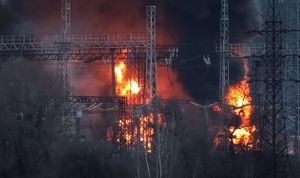Donald Trump has proclaimed his intention to revive America’s energy sector through the establishment of a National Energy Council, which he believes will help the United States achieve what he calls "energy dominance" globally. Announcing this initiative during the recent campaign stump, Trump insists this move is necessary for national security and economic growth.
According to the Associated Press, Trump's ambitious plan aims to bolster U.S. production of oil, natural gas, and renewable energy, asserting it will also reduce dependence on foreign energy supplies. He echoes sentiments he voiced during his previous presidency, when he sought to liberate the U.S. energy industry from what he characterized as burdensome regulations.
Despite the enthusiasm surrounding this initiative, experts warn it faces significant hurdles. Many argue logistical, environmental, and geopolitical factors could hinder its implementation. Environmentalists and some lawmakers have raised concerns about the potential impacts of increased fossil fuel production, especially with existing climate change commitments looming large.
The proposed National Energy Council would target various objectives such as enhancing energy efficiency, fostering innovations in renewable energy technologies, and ensuring the U.S. remains competitive on the global stage during transitioning energy demands. But as Trump’s critics point out, the realities of environmental regulations and international climate agreements could place limits on how far the council can go.
Trump suggested the council would streamline energy policies, making them less complicated for the industry, which he argues could attract investment and create jobs. The potential for job creation is particularly pivotal to his argument, aiming to garner voter support as he tries for re-election.
Setting out his vision, Trump stated, "America’s energy production should benefit all Americans, not just the privileged elite." Such rhetoric resonates with his base who have expressed frustration over rising energy prices and what they perceive as governmental overreach.
Yet implementing this energy dominance vision raises questions. Some analysts propose the Council could overstep existing environmental safeguards, pushing projects through faster than the current regulations allow. Given the politically polarized climate, any rapid regulatory changes could spark intense backlash not just from environmental advocacy groups but also from states and businesses concerned about sustainable development.
The proposed goals of vastly increased production and exploration echo earlier stances under Trump's administration. He has pushed for drilling on federal lands and offshore sites, stating, "Energy independence is actually security. It's a lot safer for us to be energy independent, and we're going to make it happen, folks."
Despite this push from Trump, analysts remind us of the realities at play. For example, the U.S. remains committed to climate agreements, including reducing greenhouse gas emissions as part of global efforts to combat climate change. Many professionals within the sector warn this could create conflict with the energy council's goals.
The challenges aren’t solely regulatory. Geopolitical issues also complicate Trump’s energy plans. Relations with key oil-producing nations could shift and impact supply chains, making Trump’s domestic ambitions harder to realize. Experts suggest any approach seeking to minimize foreign influence on energy relies on increasingly complex international dynamics.
Meanwhile, public perception plays a considerable role. While the idea of populist energy policies appeals strongly to Trump’s supporters, the broader electorate may have different priorities, especially environmental issues. Polls show increasing awareness and concern about climate change among younger voters, who may contradict Trump's ambitions if they feel their environment is at stake.
Despite these potential hurdles, the U.S. energy sector possesses remarkable adaptability and resilience. Numbers from the Energy Information Administration show how renewable energy has gained significant footing over the past few years, showing promise as part of the larger strategy.
Analysts acknowledge the complexity behind transitioning to cleaner energy sources along with cultivating traditional ones. They argue it’s incredibly difficult to envision true "energy dominance" without balancing the two effectively.
By race day, Trump could find not only new competitive rivals for voter support but also potentially conflicting visions of energy policies among Democratic opponents, particularly those center around sustainability and innovation versus traditional production. With Trump's proposals likely to dominate debates, how voters respond to his strategy will be key.
All said, Trump's energy council, should it gain traction, reflects broader themes within American politics: the struggle for energy autonomy, regional competitiveness, environmental sustainability, and the growing influence of varying public sentiments on policy decisions. The stage appears set for a rigorous showdown over the future of America’s energy strategy.
Whether Trump’s vision aligns with the public's interpretation of progress remains uncertain. What is clear is the energy debate is only just beginning and could shape the contours of the 2024 election significantly.



